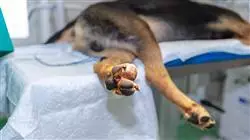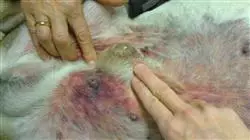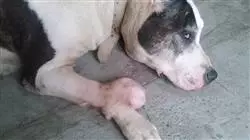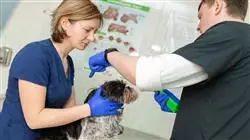University certificate
The world's largest faculty of veterinary medicine”
Description
Incorporate the latest techniques and treatments in veterinary oncology into your daily practice"

In recent years, veterinary oncology has experienced considerable growth, mainly due to the increased longevity of pets and their greater affective bonds with their owners.
Cancer treatments for animals do not always offer possibilities for a “cure”; however, the veterinarian must be aware of the therapeutic options available for consideration. Neoplastic diseases are increasingly being considered as chronic. That is why early and accurate identification or diagnosis of an animal with cancer is essential, especially as prognosis varies significantly. However, this is not always possible due to the number of clinical manifestations that accompany the wide variety of neoplasms.
A correct anamnesis is fundamental and must take into account the data found for each clinical history (age, race), physical examination (masses), as well as diagnostic imaging techniques (radiography, ultrasound, endoscopy, CT and MRI).
The topics covered in this program have been selected to offer complete, up to date and quality specialization in internal medicine, thereby providing students with knowledge that will allow them to safely deal with cases and carry out adequate follow up, monitoring and therapeutic procedures.
The teaching staff of them is made up of specialists from within different areas of internal medicine with extensive clinical experience. These faculty members have received accreditation as specialists in different fields such as cardiology, ophthalmology, diagnostic imaging, dermatology and oncology, and have often collaborated together in veterinary specialty centers. In addition to providing quality clinical work, some of these experts actively participate in various research projects parallel to their teaching and clinical activities.
This program is organized to allow for logical and intuitive in depth study as well as the consolidation of diagnostic, therapeutic and follow up protocols"
This postgraduate certificate in Oncological Diseases in Small Animals contains the most complete and up to date educational program on the market. Its most important features include:
- Case studies presented by experts in Oncological Diseases in Small Animals
- Graphic, schematic and practical contents created to provide scientific and practical information on those disciplines that are essential for professional development
- New developments in Oncological Diseases in Small Animals
- Practical exercises where self assessment can be used to improve learning
- Special emphasis on innovative methodologies in Oncological Diseases in Small Animals
- Theoretical lessons, questions to the expert, debate forums on controversial topics, and individual reflection assignments
- Content that is accessible from any fixed or portable device with an Internet connection
Upon completion of the program, students will have obtained knowledge that is essential for professional practice, whether they choose to exercise in a clinical, academic or research context"
Its teaching staff includes professionals from the veterinary field, who bring the experience of their work to this training, as well as recognised specialists from leading societies and prestigious universities.
The multimedia content, developed with the latest educational technology, will provide the professional with situated and contextual learning, i.e., a simulated environment that will provide immersive learning programmed to train in real situations.
This program is designed around Problem Based Learning, whereby the professional must try to solve the different professional practice situations that arise throughout the program. For this purpose, the professional will be assisted by an innovative interactive video system created by renowned and experienced experts in the field of Dermatological Diseases in Small Animals.
Each unit is accompanied by clinical cases that aim to teach students to apply the knowledge acquired and includes activities that will allow them to assess their progress”

Our multimedia methodology allows students to perform interactive activities and learn in a more practical way”
Objectives
The postgraduate certificate in Oncological Diseases in Small Animals is designed to facilitate the performance of the veterinary professional with the latest advances and most innovative procedures in the field.

Do not think twice and join our educational community. You'll reach your academic goals in no time”
General Objectives
- Recognize most frequent neoplasms in pet animals
- Identify main cell lines at the cytological level
- Establish correct diagnostic protocol according to anamnesis and physical examination of animal
- Elaborate most appropriate treatment according to nature of tumor and physical condition of patient
Specific Objectives
- Recognize main oncological emergencies
- Identify main differences between mammary tumors in bitches and female cats
- Become familiar with the most common cytostatics and their management when administering chemotherapy
- Know how to manage an initial oncology consultation with owners
- Identify paraneoplastic syndromes and find a means of approach
- Assess different therapeutic options depending on type of neoplasm
- Propose diagnostic protocol that allows for adequate tumor staging
- Establish best therapeutic option(s) once stage of tumor is determined

This postgraduate certificate is unique in its category, which will allow students to acquire specialized knowledge in order to offer high quality internal medicine services to clients and patients"
Postgraduate Certificate in Oncological Diseases in Small Animals
.
In recent times, Veterinary Oncology has experienced a great growth in the clinical setting due to the increase of pets, making it relevant for veterinarians to master the therapeutic options available for the treatment of Cancer in pets. Even when cure is not possible. Increasingly, neoplastic diseases are considered chronic, making early and accurate diagnosis imperative, having a significant impact on prognosis. But this is quite complex because of the numerous clinical manifestations that may be present in different types of Neoplasms, being of high value a Postgraduate Certificate in Oncological Diseases in Small Animals such as this one.
Get a high preparation in the latest advances against Cancer in small animals
.
Thus, the objective of the Postgraduate Certificate in Oncological Diseases in Small Animals is to offer you a complete, updated and high quality preparation in Internal Medicine so that you can approach these oncological processes with the best guarantees and carry out a follow-up, monitoring and adequate treatment. This great academic opportunity is condensed into only 150 hours, forming an educational journey in which you will use the experience of eminent veterinary oncologists.







